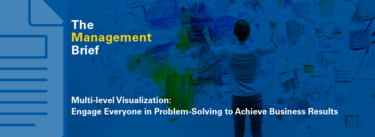In October, I asked for your help. I’m glad I did. And now, having solicited your assistance, I owe you a report.
About 400 of you responded with excellent suggestions for the final “Learning Session” for the upcoming LEI Lean Transformation Summit. As you will recall, every year among the Summit offerings is a set (six this year) of focused learning sessions. You told us that your biggest interests were in the areas of management and capability development. A review of the overall Summit agenda quickly reveals that the topic of management is covered in the fundamental Summit design. So, our final two Learning Sessions will both revolve around capability development, as well as the role of management in its employ.
A great choice, as there is nothing more critical to consistent success than developing the capabilities of individuals and organizations. And the two specific sessions we chose perfectly embody our theme of “Frontiers and Fundamentals.” Let me share what the sessions will cover.
Capability Development: TWI at IBM Today and the Toyota Improvement Kata
Solving Problems with TWI at IBM – Jeff Maling. Jeff is an engineer at IBM’s Burlington, VT, production facility and one of the many who have been a part of resurrecting the production training program known as “Training Within Industry” (TWI), a system that was implemented widely through U.S. industry during WWII.
I believe the creation and practice of the TWI programs represents the most under-appreciated achievement of 20th century American industry. Anyone familiar with the Toyota Production System is well aware of its roots in Henry Ford’s system of flow production. But few people have been aware of the role of TWI. After some rumblings of rediscovery in the 1990s, TWI began experiencing a boom in the mid-2000s, boosted by new research by folks like Jim Huntzinger and others (click here for Jim’s article), several excellent books (see Productivity Press books by Patrick Graupp and Bob Wrona, and Don Dinero), and an annual conference that will convene for its fifth time on May 17-18, 2011. (Click here for an online TWI community.)
Toyota Kata – Mike Rother
You surely know Mike from the workbooks Learning to See, Creating Continuous Flow and his new book, Toyota Kata. Over 20 years of studying continuous improvement in a wide variety of manufacturing settings led Mike to apply the concept represented by the Japanese term “kata” (borrowed from Asian martial arts where it indicates a form movement to be learned, to be mastered) to the basic patterns of work, thinking, coaching, and managing that can lead to deep learning, changed behavior, and sustainable continuous improvement.
Together these two final additions should meet your specifications while nicely rounding out our line-up of Learning Sessions, and complimenting the plenary and breakout sessions from our four example companies: Ford, Acme Alliance, Coca Cola, and Starbucks.
Capability Development – Making Scientists of Us All
You’ve probably come across this lean principle: “Before we make product, we make people.” If we accept that as true, then we must ask ourselves, what capabilities must we ensure are embedded in our people, in ourselves? Consider the following (from my foreword to Training Within Industry – The Foundation of Lean by Don Dinero):
“TWI wasn’t developed on paper, in a laboratory, and then rolled out to the masses. Rather, it was developed over time through actual practice and implementation — each iteration adapting the continuous improvements of the program. Were the programs standardized? Yes, certainly. Were they static? Absolutely not.
“This dynamic captures one of the most important and often overlooked aspects of the Toyota Production System: the central role of Standardized Work. TPS and TWI take us away from the command and control of the typical application of ‘Scientific Management’ to true Management by Science. A common misperception of standardization is assuming it is simply regimentation, or command and control, when in fact its true value is to serve as the basis of experimentation. Standards are set — as bases of comparison — and are used as baselines for improvement. Far from reducing individual work into regimented chores, Standardized Work can enable individual innovation at every level of the organization. We have come to call this process ‘continuous improvement.’ Deming called it plan-do-check-act (PDCA). You can learn about it through learning about, and practicing, TWI.”
Frontiers and Fundamentals of Learning and Building Capability
You can see both Frontier and Fundamental dimensions of capability development in Mike’s Kata session and Jeff’s TWI session as well as others. Some profound “frontiers” of scientific learning about learning are embodied in these two new sessions, Mike’s explicitly but Jeff’s also, as well as the others. According to Daniel Coyle, author of a wonderful book (required reading) called The Talent Code, recent research on human learning shows that learning, or “talent acquisition,” is built on practice, a fact that lean practitioners (and many others, of course) have long known:
“Deep practice is built on a paradox: struggling in certain targeted ways — operating on the edges of your ability, where you make mistakes — makes you smarter.
“It’s … that productive, uncomfortable terrain located just beyond our current abilities, where our reach exceeds our grasp. Deep practice is not simply about struggling, it’s about seeking out a particular struggle, which involves a cycle of distinct actions:
- Pick a target
- Reach for it
- Evaluate the gap between the target and the reach
- Return to step one.”
To those of you familiar with the foundational Training Within Industry programs or Mike’s breakthroughs with the Toyota Improvement Kata, these new research findings will sound both new and very familiar at the same time.
John
John Shook
Chairman and CEO
Lean Enterprise Institute, Inc.
jshook@lean.org






